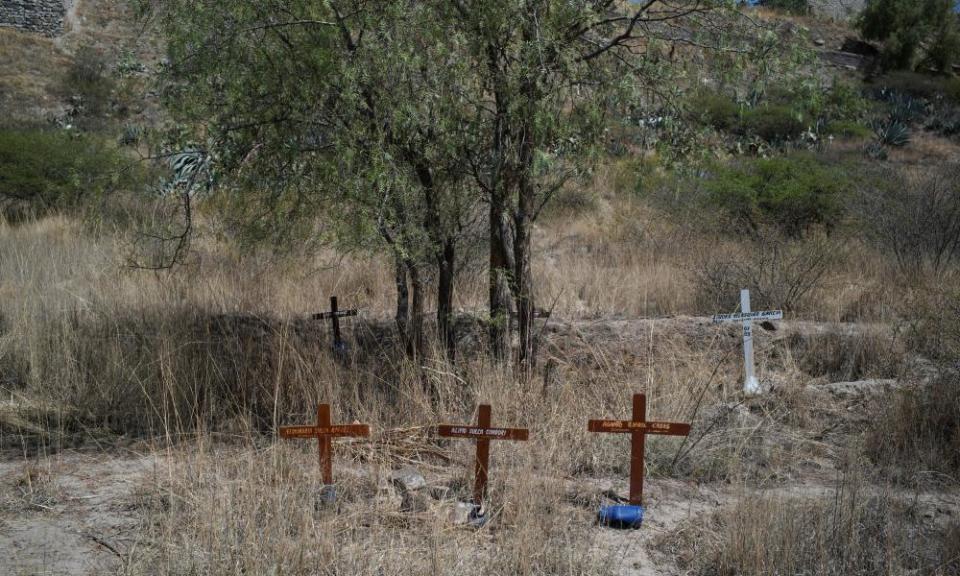Shining Path’s brutal messianic leader is dead. What to do with the body?

Nearly a week after the death of Abimael Guzmán, the messianic leader of Peru’s Shining Path insurgency which killed tens of thousands of people in the 1980s and 90s, the country remains gripped by the debate over what to do with his remains.
At least one local media outlet reported that the cabinet voted on Wednesday 13 to 5 to reject a supreme decree that would lay the legal framework to cremate the remains of the former guerrilla leader, who died on Saturday in a maximum-security prison at age 86.
Related: Abimael Guzmán, leader of Peru’s Shining Path, dies aged 86
Guido Bellido, the cabinet chief, denied the report, saying on Thursday that the justice ministry’s proposal to cremate the body “had not been addressed”.
But the absence of a firm decision by Peru’s new leftist government has sown doubts about the cabinet’s willingness to act, aggravated by the presence of at least two ministers who are alleged to have sympathies, or direct links to, the terror group that Guzmán founded.
Bellido himself has been accused of defending the Shining Path and is being investigated for alleged “apology for terrorism”, while the labour minister, Íber Maraví, allegedly formed part of the terror group in its beginnings in Ayacucho, where Guzmán was a university professor.
By law, the authorities should hand over Guzmán’s body to direct relatives, the public prosecutor’s office said earlier this week. But in this case, that is Elena Iparraguirre, Guzmán’s widow and second-in-command in the Maoist movement – who is herself serving a life sentence in prison.
Public officials and rights groups are afraid that giving the remains to Iparraguire would lead to a burial site that could become a shrine for the terror group’s sympathisers, whose factions continue to carry out deadly attacks on Peruvians.
Guzmán, a former philosophy professor, wielded a powerful personality cult over fanatical followers who unleashed a savage civil conflict in May 1980 marked by massacres, bombings, kidnappings and assassinations, and killed tens of thousands of Peruvians.
On Wednesday, a prosecutor denied Iparaguirre’s request for her husband’s remains, leaving them in the custody of the public prosecutor’s office.
“In another government, this wouldn’t even be discussed,” said José Pérez Guadalupe, a former interior minister and criminologist.
“There is the law which states the families can recover the body of an inmate but there is also the right of the victims – thousands of victims in Peru – not to be revictimized.”
“Elena [Iparraguirre] is not just the widow, she’s an accomplice in the genocide, who is also condemned to life imprisonment,” he said.
“Bad people, cruel people should not be remembered,” said Lurgio Gavilán, 48, speaking by telephone from Huamanga, the regional capital of Ayacucho. The city was where Guzmán founded the Sendero Luminoso or Shining Path, and it became the centre of the bloodshed, which killed more than 69,000 Peruvians, according to a truth and reconciliation commission. The brunt of the savagery from both sides was born by the Quechua-speaking peasant population.
Related: Peru minister resigns after suggesting Shining Path rebels had CIA support
Gavilán was a witness to the violence unleashed by the terror group and the vicious response of the state security forces: at 13, he was recruited as a Shining Path fighter, but later became a soldier and is now an anthropology professor at Ayacucho’s San Cristobal University – where Guzmán once taught philosophy.
“No one can deny Sendero acted with so much cruelty. There was so much suffering and the trauma of what happened continues still,” he said.
“Who would go there to pay homage,” he asked in disbelief when asked about the possibility of a tomb for the terror leader. “Abimael Guzmán was repudiated a long time ago.”
But he added: “We, Peruvians are responsible, we created him. Now we understand we can never, ever return to violence.”
Lidia Flores in Quechua, president of the Ayacucho-based National Association of Families of the Kidnapped, Detained and Disappeared of Peru, known as Anfasep, was incredulous at the idea that Guzmán’s remains might be buried.
“We should all agree to burn [the remains] and throw [them] away,” she said.

 Yahoo Finance
Yahoo Finance 